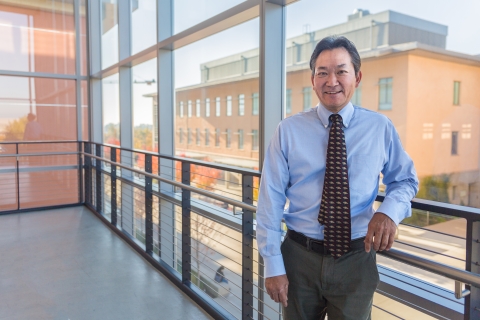
Professor Chris Amemiya is new to UC Merced, but he’s a veteran scientist with a long list of breakthroughs to his name.
Amemiya’s discoveries have changed the way scientists understand vertebrate genomes and their evolution, and he was recently elected a fellow of the American Association for the Advancement of Science (AAAS). He is UC Merced’s first biology professor, the second Health Sciences Research Institute (HSRI) affiliate, and fifth faculty member overall to receive this honor.
“Dr. Amemiya’s election as an AAAS fellow is a great honor that is bestowed on a small number of researchers who have made important and impactful contributions to their fields,” Dean of Natural Sciences Betsy Dumont said. “We join him in celebrating this success and are proud to have him among us.”
AAAS honored Amemiya for his “distinguished contributions to developmental genetics, especially for genetic and genomic studies of the coelacanth and other fish, and their implications for developmental evolution.”
Amemiya’s lifelong fascination with natural history and evolution was fostered by having grown up in Hawaii, a natural laboratory for evolution. Before coming to UC Merced, he spent 16 years on the faculty of the Benaroya Research Institute in Seattle, where he developed novel methods to study evolution and development (evo-devo).
“The work I’ve done has led to new ways of thinking about evo-devo problems,” Amemiya said. “I’m interested in studying how certain structures originated, in particular the emergence of the immune system and the innovations that enabled life on land.”
Amemiya made pioneering contributions to the development of bacterial artificial cloning (BAC) systems, which allowed scientists to study genomes long before whole-genome sequencing was a standard tool in the biologist’s arsenal. Using these methods, Amemiya helped scientists gain a better understanding of how vertebrate immune systems evolved.




